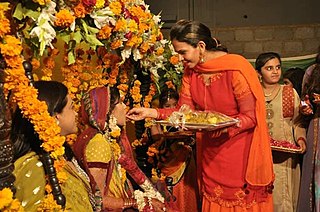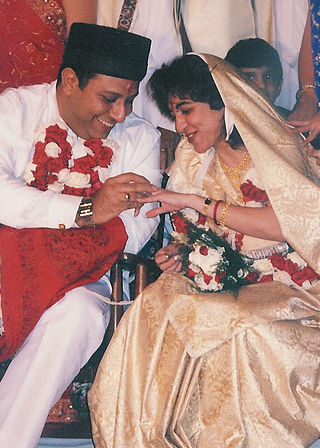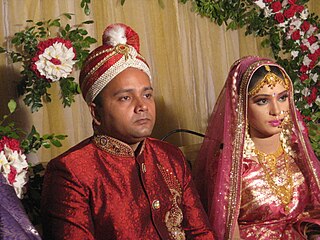Related Research Articles

A wedding is a ceremony where two people are united in marriage. Wedding traditions and customs vary greatly between cultures, ethnicities, races, religions, denominations, countries, social classes, and sexual orientations. Most wedding ceremonies involve an exchange of marriage vows by a couple, presentation of a gift, and a public proclamation of marriage by an authority figure or celebrant. Special wedding garments are often worn, and the ceremony is sometimes followed by a wedding reception. Music, poetry, prayers, or readings from religious texts or literature are also commonly incorporated into the ceremony, as well as superstitious customs.
A white wedding is a traditional formal or semi-formal wedding originating in Great Britain.

West Nusa Tenggara is a province of Indonesia. It comprises the western portion of the Lesser Sunda Islands, with the exception of Bali which is its own province. The area of this province is 19,675.89 km2 (7,596.90 sq mi) which consists of two main islands, namely Lombok Island and Sumbawa Island as well as several other small islands. The two largest islands in this province are the smaller but much more populated Lombok in the west and the much larger in area but much less densely populated Sumbawa island in the east. Mataram, on Lombok, is the capital and largest city of the province. It shares maritime borders with Bali to the west and East Nusa Tenggara to the east.

Elopement is a marriage which is conducted in a sudden and secretive fashion, sometimes involving a hurried flight away from one's place of residence together with one's beloved with the intention of getting married without parental approval. An elopement is contrasted with an abduction, in which either the bride or groom has not consented, or a shotgun wedding in which the parents of one coerce both into marriage.

Bride kidnapping, also known as marriage by abduction or marriage by capture, is a practice in which a man abducts and rapes the woman he wishes to marry.
A Hindu wedding, also known as Vivaha, Marathi: Lagna (लग्न), Bengali: Bibaho (বিবাহ), Kalyanam, Kannada script: ಮದುವೆ (Maduve), Tamil: திருமணம் (Tirumanam), or Pelli, is the traditional wedding ceremony for Hindus. The wedding ceremonies are very colourful, and celebrations may extend for several days and usually a large number of people attend the wedding functions. The bride's and groom's home—entrance, doors, wall, floor, roof—are sometimes decorated with colors, flowers, and other decorations.

Wedding photography is a specialty in photography that is primarily focused on the photography of events and activities relating to weddings. It may include other types of portrait photography of the couple before the official wedding day, such as a pre-wedding engagement session, in which the photographs are later used for the couple's wedding invitations. On the wedding day, the photographer(s) will provide portrait photography as well as documentary photography to document the different wedding events and rituals throughout the day(s).

Ala kachuu is a form of bride kidnapping practiced in Kyrgyzstan. The term can apply to a variety of actions, ranging from a consensual elopement to a non-consensual kidnapping, and to what extent it actually happens is controversial. Some sources suggest that as of 2005 at least a third of Kyrgyzstan's brides had been taken against their will.

Marriage in Pakistan pertains to wedding traditions established and adhered by Pakistani men and women. Despite their local and regional variations, marriages in Pakistan generally follow Islamic marital jurisprudence. Marriages are not only seen as a union between a husband and a wife, but also an alliance between their respective families. These traditions extend to other countries around in the world where Overseas Pakistani communities exist.

A Zoroastrian wedding is a religious ceremony in Zoroastrianism in which two individuals, a man and a woman, are united. In Zoroastrianism, marriage within the community is encouraged, and is greatly favored in religious texts. The following information will detail ceremony procedures and traditional processes for a Zoroastrian wedding.
In the United States and Canada, weddings follow traditions often based on religion, culture, and social norms. Most wedding traditions in the United States and Canada were assimilated from other, generally European, countries. Marriages in the U.S. and Canada are typically arranged by the participants and ceremonies may either be religious or civil.

Muslim marriage and Islamic wedding customs are traditions and practices that relate to wedding ceremonies and marriage rituals prevailing within the Muslim world. Although Islamic marriage customs and relations vary depending on country of origin and government regulations, both Muslim men and women from around the world are guided by Islamic laws and practices specified in the Quran. Islamic marital jurisprudence allows Muslim men to be married to multiple women.
The Telugu Hindu wedding ceremony is the traditional wedding ceremony of the Telugu people in India. In the 19th century, the ceremony could last up to sixteen days. In modern times, it can last two or more days, depending on the family's financial and social status. The pelli or wedding is considered the strongest of social bonds, and is said to spiritually merge two souls opening the doors to gruhastaashramam. There is a Telugu saying that "Marriage is supposed to be a family union and not an individual formality." However, with changing mindset of the younger generation and due to globalization, marriage these days is being mainly focused solely on the union of the young couple only.
The Sicilian term fuitina refers to a practice that used to be common in Sicily and other areas of Southern Italy, whereby a young couple would elope in order to get married against the wishes of their families. The intent is that the prolonged absence of the fugitive couple would let their families presume that sexual intercourse had occurred and thus force them to consent to a so-called "rehabilitating wedding". While elopements of young couples are reported to be widespread in places such as Palermo, most of them only bear a surface relationship with traditional fuitine, as they are not necessarily aimed at a rehabilitating marriage.

Gendang beleq is a dance and music performance from Lombok island, Indonesia. It is a popular performance among the native Sasak people.

Ukuthwala is the South African term for bride kidnapping, the practice of a man abducting a young girl and forcing her into marriage, often without the consent of her parents. These "marriages by capture" occur mainly in rural parts of South Africa, in particular the Eastern Cape and KwaZulu-Natal. The Basotho call it tjhobediso. Among the Xhosa and Zulu people, ukuthwala was once an acceptable way for two young people in love to get married when their families opposed the match. Ukuthwala has been abused, however, "to victimize isolated rural women and enrich male relatives."
Forced pregnancy is the practice of forcing a woman or girl to become pregnant or remain pregnant against her will. This act is often as part of a forced marriage, as part of a programme of breeding slaves, or as part of a programme of genocide. Forced pregnancy is a form of reproductive coercion.

Bride price, bride-dowry, bride-wealth, bride service or bride token, is money, property, or other form of wealth paid by a groom or his family to the woman or the family of the woman he will be married to or is just about to marry. Bride dowry is equivalent to dowry paid to the groom in some cultures, or used by the bride to help establish the new household, and dower, which is property settled on the bride herself by the groom at the time of marriage. Some cultures may practice both simultaneously. Many cultures practiced bride dowry prior to existing records.
Marriage in Indonesia is carried out by one sacred recipient man and one woman with the intention of formalizing the marriage bond according to religious norms, legal norms, and social norms.
References
- ↑ "In Indonesia, Bride Kidnapping Tradition Fuels Child Marriage Despite New Ban". Reuters. 2019-10-31. Retrieved 2024-09-02.
- ↑ Fairiza, Andre; Widyatama, Rendra (2024-01-31). "MERARIQ DALAM PERNIKAHAN SUKU SASAK: ANALISIS KOMUNIKASI DAN DINAMIKA SOSIAL DALAM RITUAL PENCULIKAN". Jurnal Analisa Sosiologi (in Indonesia). 13 (1). doi:10.20961/jas.v13i1.74926. ISSN 2615-0778.
{{cite journal}}: CS1 maint: unrecognized language (link) - ↑ KAHARUDDIN (2006). The Merariq (Elopement) Custom of the Sasak People from the perspective of Islamic marriage law in West Nusa Tenggara (Thesis). Universitas Gadjah Mada.